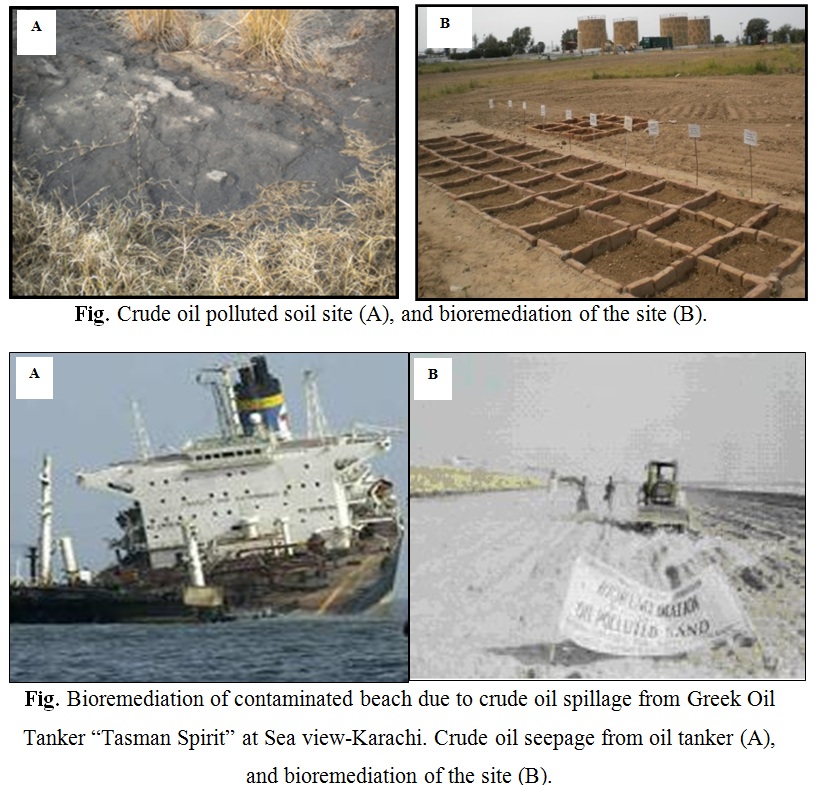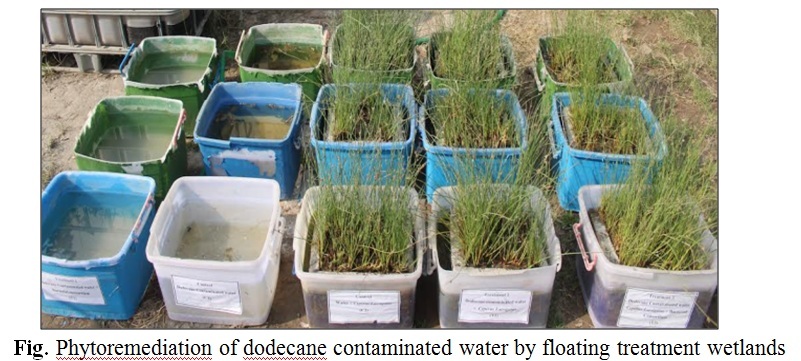|
Qualification:
- B.Sc. 1995 (Chemistry, Zoology, Botany) University of the Punjab, Lahore, Pakistan
- M.Sc. 1997 (Chemistry) University of Agriculture Faisalabad, Pakistan
- M. Phil 2002 (Biotechnology) Quaid-e-Azam University Islamabad, Pakistan
- PhD Scholar (Biotechnology) PIAES, Islamabad, Pakistan.
Research Attentions:
- Phytoremediation of different environmental pollutants in industrial waste water.
- Bioremediation of petroleum and petroleum fractions in soil, water and wastewater
- Production of different biosurfactants from renewable cost effective sources
- Molecular analysis of genes involved in hydrocarbons degradation and their characterization
- Analysis of water, wastewater, soil, sludge and fabric for different pollution parameters for commercial services
Projects:
- Contract completed with National Cleaner Production Center (NCPC), Rawalpindi for biodegradation of different oily sludge generated from oil refineries.
- Bioremediation of oil spilled from an oil tanker Tasman spirit at Sea View Beach, Karachi.
- Contract completed with PCRWR for analysis of water, soil and vegetables samples collected from all over the Pakistan.
- Contract completed with City District Govt. for analysis of drinking water samples collected from the whole district, Faisalabad.
- Commercial services provided in Environmental Testing Services Group for analysis of different environmental samples.
Research Activities
On-Site Remediation of Crude Oil Contaminated Soil:
Petroleum is one of the dominant components of our modern industrial society but its extraction and production results in environment contamination with hydrocarbons. It can directly affect the human life because of its detrimental effects on vegetation, animals and ultimately to humans health. Bioremediation offered the potential tools for the future application of this technology for the degradation of petroleum pollutants in contaminated soil and water. By our research group bioremediation of crude oil contaminated soil using rhamnolipids with biostimulation and bioaugmentation technology has been applied in the vicinity of an oil field.

Phytoremediation of Dodecane and Xylene in Floating Wetland
Plant microbial synergism strengthening the phytoremediation of soil and water contaminated with petroleum constituents, e.g., alkane and aromatic hydrocarbons (dodecane, hexadecane, and xylene) in floating wetland.

Publications:
- Fahid, M., Arslan, M., Shabir, G., Younus, S., Yasmeen, T., Rizwan, M., Siddique, K., Ahmad, S.R., Tahseen, R., Iqbal, S., Ali, S., and Afzal, M. (2020). Phragmites australis in combination with hydrocarbons degrading bacteria is a suitable option for remediation of diesel-contaminated water in floating wetlands. Chemosphere, 240, p.124890.
- Tahseen, R., Arsalan, M., Iqbal S., Khalid, Z. M., Afzal, M. (2019). Enhanced degradation of hydrocarbons by gamma ray induced mutant strain of Pseudomonas putida. Biotechnology Letters, 41(3), pp.391-399.
- Hussain, F., Tahseen, R., Arslan M., Iqbal, S., Afzal, M. (2019). Removal of hexadecane by hydroponic root mats in partnership with alkane-degrading bacteria: bacterial augmentation enhances system's performance. International Journal of Environmental Science and Technology, 16, pp.4611–4620.
- Ahsan, M.T., Tahseen, R., Ashraf, A., Mahmood, A., Najam-ul-haq, M., Arslan, M., Afzal, M. (2019). Effective plant-endophyte interplay can improve the cadmium hyperaccumulation in Brachiaria mutica. World Journal of Microbiology and Biotechnology, 35(12), p188.
- Afzal, M., Rehman, K., Shabir, G., Tahseen, R., Ijaz, A., Hashmat, A. J., Brix, H. (2019). Large-scale remediation of oil-contaminated water using floating treatment wetlands. pjClean Water-Nature, 2(1):3; doi:10.1038/s41545-018-0025-7.
- Afzal, M., Arslan, M., Müller, J. A., Shabir, G., Islam, E., Tahseen, R., Haq, A., Hashmat, A. J., Iqbal, S., Khan, Q. M. (2019). Floating treatment wetlands as a suitable option for large-scale wastewater treatment. Nature Sustainability, 2(9), pp863-871.
- Shahid, M.J., Arslan, M., Saddique, M., Ali, S., Tahseen, R., Afzal, M., (2019). Potentialities of floating wetlands for the treatment of polluted water of river Ravi, Pakistan. Ecological Engineering. 133,167-176.
- Ashraf S., Afzal, M., Rehman, K., Tahseen, R., Naveed, M., Ahmad, Z., (2018). Enhanced remediation of tannery effluent in constructed wetlands augmented with endophytic bacteria.Desalination and Water Treatment, 102, pp93–100.
- Shahid, M. J., Tahseen, R., Siddique, M., Ali, S., Iqbal, S., Afzal, M. (2018). Remediation of polluted river water by floating treatment wetlands. Water Science and Technology-Water Supply. 19(3), pp.967-977.
- Saleem, H., Arslan, M., Rehman, K., Tahseen, R. and Afzal, M., (2018). Phragmites australis—a helophytic grass—can establish successful partnership with phenol-degrading bacteria in a floating treatment wetland. Saudi Journal of Biological Sciences.20:692–698.
- Tahseen, R., M. Afzal, S. Iqbal, G. Shabir, Q.M. Khan, Z.M. Khalid, I.M. Banat, (2016). Rhamnolipids and nutrients boost remediation of crude oil contaminated soil by enhancing bacterial colonization and metabolic activities. Intl. Biodt. Biod. 115, pp.192-198.
- Tara, N., Afzal, M., Ansari, T.M., Tahseen, R., Iqbal, S., Khan Q.M. (2014). Combined use of alkane-degrading and plant growth-promoting bacteria enhanced phytoremediation of diesel contaminated soil. Int. J. Phyto., 16(7-12), pp.1268-1278.
- Shabir, G., Afzal, M., Tahseen, R., Iqbal, S., Khan, Q.M., Khalid, Z.M. (2013). Detoxification of oil refinery wastewater by pilot scale fed batch reactor followed by coagulation and filtration. A. J. E. P, 1(1), pp.10-13.
- Afzal, M., Shabir, G., Tahseen, R., Islam, E., Iqbal, S., Khan, Q.M., Khalid Z.M. (2013). Endophytic Burkholderia sp. strain PsJN improves plant growth and phytoremediation of soil irrigated with textile effluent. Clean Soil Air Water, 41(9999), pp.1-7
- Shabir G., Afzal M., Anwar F., Tahseen R., Khalid Z. M. (2008). Biodegradation of kerosene in soil by a mixed bacterial culture under different nutrient conditions. Intl. Biodt. Biod, 61, pp.161-166.
- Khalid Z. M., Tahseen R., Afzal M., Malik K. A. (2005). Successful application of bioremediation for decontamination of oil contaminated seashore. Proceeding of First International Conference on Environmentally Sustainable Development v. 1-3. ESDev -II: 1211-1217.
|